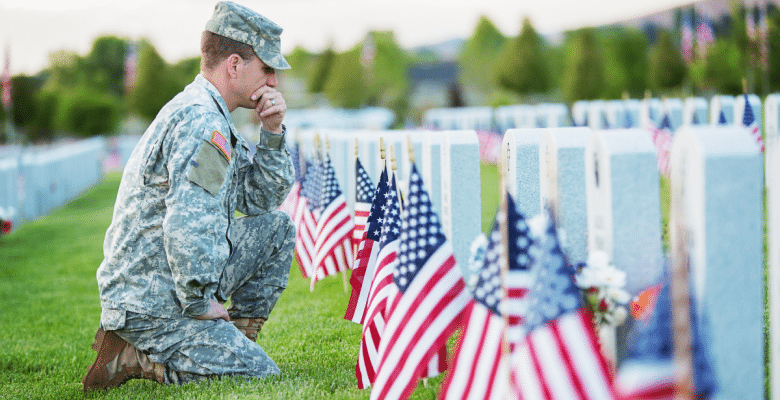Most of us know that Memorial Day is a national holiday where we honor the brave men and women who have died while serving in the U.S. military to protect our freedom. But truth be told unless you have served or know someone in the military, it’s easy to feel disconnected from the meaning of the holiday. Instead, Memorial Day weekend can often feel like just another long weekend where we step away from the everyday stresses of life and relax with friends and family. This break can be great for our mental health!
But perhaps this year, we can feel more connected to the holiday by holding space for the mental health struggles so many veterans carry with them every day. And with more and more Americans outside of the military battling mental health disorders since the COVID-19 outbreak, there can be a sense of commonality between all of us, whether we have served in the military or not. As more of us seek treatment for our mental health, we can bridge the divisions of stigma associated with mental health, and instead can collectively prioritize our wellbeing.
Veterans and Mental Health
According to one of the most extensive studies on Mental Health risks among the U.S. military, the rate of major depression among soldiers was five times as high as among civilians, and the rate of PTSD was 15 times higher. And nearly 20% of service members returning from Afghanistan and Iraq reported experiencing a traumatic brain injury, according to a study from the RAND Center for Military Health Policy Research.
When left untreated, these mental health struggles can have highly adverse effects on veterans and their families. Studies show that battling depression, PTSD, and traumatic brain injury can exhibit higher rates of unhealthy behaviors and higher rates of suicide. One recent study revealed that more than 30,000 active duty and veterans of post-9/11 wars have died by suicide over the last 20 years.
The mental health struggles that those on active duty and veterans face during and after their service can feel insurmountable. Therefore, it is paramount that they have access to treatment.
Civilians and Mental Health
While mental health has become an increasingly important topic in the last decade, COVID-19 exacerbated mental health matters for many Americans. For example, during the first nine months of the pandemic, Americans reported rates of depression and anxiety six times higher than in 2019, according to research conducted at Boston College.
Among U.S. adults ages 18-29, rates of anxiety and depression increased to 65% and 61%, respectively. The study suggests that easy and affordable access to mental health treatment is necessary in today’s rapidly changing world.
Whether you or someone you know is in the military or a civilian, Advanced Behavioral Health offers a wide range of services for those who are struggling. Therapy services include:
- Animal Assisted Play Therapy
- Cognitive Behavioral Therapy
- Dialectical Behavior Therapy
- Eye Movement Desensitization and Reprocessing Therapy (EMDR)
- Individual/Group Therapy
- Medication Management
- Psychiatric Treatment
- Trauma-Focused Cognitive Behavioral Therapy
If you or someone you know could benefit from seeking treatment, take our short survey to help you decide which treatment could be most beneficial. You can also call 301-345-1022 to speak to one of our representatives or email us. You are not alone in your mental health journey; Advanced Behavioral Health is here to help.
